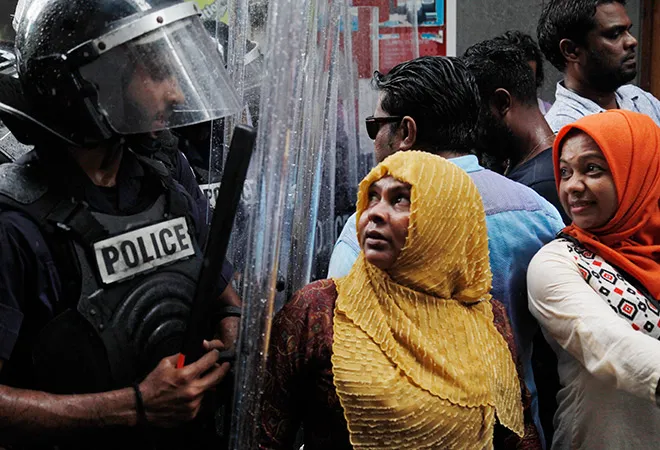The debate in New Delhi about how India should handle the Maldives has become increasingly critical of the government’s approach. Though this is by no means the universal opinion, the increasing perception is that New Delhi is finding it difficult to forge a path to a peaceful resolution that would preserve its interests and credibility.
The current crisis started when the Maldivian President Abdulla Yameen decided to ignore the Maldivian Supreme Court’s ruling on 1 February, which called the Yameen government imprisonment and prosecution of opposition leaders a “violation of the constitution and international law.” The Court also ruled that the government should release the nine opposition leaders including the former president, Mohamed Nasheed.
In addition to ignoring the Court order, Yameen also declared an emergency, which was extended for a month on 20 February. India expressed its dissatisfaction at the extension of emergency as well as “the manner in which the extension of the State of Emergency was approved by the Majlis in contravention of the Constitution of Maldives.” Prior to the extension of the emergency on 20 February, India had expressed the hope following the end of the emergency, Maldives returned to democracy and all the democratic institutions including the judiciary would be “allowed to function independently.”
Though a domestic political crisis, the stakes have dramatically increased because it has drawn in both India and China. Earlier in the month, Yameen had sent emissaries to China, Pakistan, and Saudi Arabia. China thereafter issued a warning that no country should intervene in Maldives’ internal matters and that “the international community shall play a constructive role on the basis of respecting the sovereignty of the Maldives, instead of further complicating the situation.” On the other hand, Maldivian opposition leaders including Nasheed have sought Indian help, including military intervention “to free the judges and political detainees.” Nasheed also has asked the United States for its help, asking it “to stop all financial transactions of Maldivian regime leaders going through US banks.”
Amidst all these developments, Reuters reported, quoting a Chinese website, that Chinese naval warships were heading to Maldives. The Indian Navy clarified that the Chinese warships were transiting between the Sunda Strait and Lombok Strait. It must be noted that China deploying warships in the Indian Ocean is nothing new: China even has a military base in Djibouti in the Horn of Africa. Not surprisingly, the Indian Navy is keeping a close watch on Chinese activities in the region. Indian Navy spokesperson Captain D.K. Sharma is reported to have remarked that “India has a very robust surveillance system to ensure clear and transparent maritime domain awareness (MDA) in the entire IOR.”
Given the Maldives’ geostrategic location in the Indian Ocean, it is understandable that China has long-term strategic interests in it. The island nation sits atop of critical sea lanes of communication (SLOCs). Gaining a larger footprint in the Indian Ocean is now part of China’s stated strategy, as it noted in its Blue Book on Indian Ocean. In 2016, the Maldives leased an atoll to a Chinese company for 50 years at an estimated cost of just $4 million.
But India has critical interests in the Maldives too. First, the Maldives is in India’s backyard, making China’s inroads there a matter of deep concern for New Delhi. The Maldives is only about 700 km from India’s Lakshadweep Islands and about 1200 km from the Indian mainland, too close for Delhi’s comfort to let a potential adversary set up shop. Just two months ago, the Maldives concluded a Free Trade Agreement (FTA) with China, much to India’s surprise. This reflects the distance that crept in between India and Maldives in recent years. In addition, the Maldives had endorsed Xi Jinping’s pet project, the Belt and Road Initiative (BRI), which also includes the Maritime Silk Road. New Delhi worries about where all this headed.
Second, there is the matter of how this will be perceived by other Indian neighbours as well as by others. India worries about its credibility in the eyes of its smaller neighbours; any Indian hesitation in the Maldives could make these neighbours look towards China more actively. Similarly, smaller nations in South and Southeast Asia will makes their own judgments about India’s reliability, about whether they should trust India to stand up to China, depending on how they perceive India is behaving in its own backyard. If India is unable to settle the Maldives issue in its favour, smaller Southeast Asian states could decide that their best bet is to make their own individual peace with China.
New Delhi would clearly prefer not to intervene militarily, if only because of how uncertain such ventures are. But India also faces increasing difficulties, especially given Yameen’s obduracy. How India navigates through this crisis will have significant impact on not only the neighbourhood, but also broader geopolitics including Sino-Indian relations.
This commentary originally appeared in The Diplomat.
The views expressed above belong to the author(s). ORF research and analyses now available on Telegram! Click here to access our curated content — blogs, longforms and interviews.




 PREV
PREV


